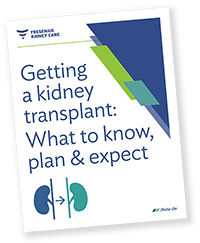What Are the Benefits and Risks of a Kidney Transplant?
Having a kidney transplant is life changing. Considered by doctors and patients as the ideal treatment for kidney failure, it’s an opportunity for your body to return to functioning naturally rather than rely on alternate forms of therapy. If you’re starting dialysis or currently on dialysis and considering a transplant, you should be aware of the many benefits, as well as the possible risks, of getting a new kidney.
Six Potential Benefits of a Kidney Transplant
Kidney transplant surgery means a functioning donor kidney is surgically implanted in your body. As long as there are no complications, it should function naturally and do all the things a healthy kidney does.
The potential benefits of a kidney transplant may include:
The potential benefits of a kidney transplant may include:
- Stopping dialysis—You may be able to stop this form of treatment altogether once your kidney function returns.
- More energy—You may feel more energetic and enjoy a more active life.
- Better overall health—You may see improvements in blood pressure, fluid retention, and other complications of kidney failure.
- Fewer dietary restrictions—You may be able to eat and drink more of what you enjoy.
- Better quality of life—You may be able to do more and feel better overall.
- Extended life—You may live longer!
Potential Risks and Side Effects of a Kidney Transplant
As with any surgery, having a kidney transplant could potentially cause complications. It’s important to understand and consider all possible outcomes. Potential risks of a kidney transplant may include:
- Temporary lack of kidney function—Your new kidney may not start working immediately and you may need dialysis until function resumes.
- Organ rejection—Your body could reject the donor organ and medication might be needed to help your body accept the new kidney.
- Kidney failure—Your new kidney may fail after a number of years and you may need to have another transplant or go back on dialysis.
- Renal artery stenosis (narrowing of the artery leading to the kidney)
- Blood clots
- Infection
- Bleeding
- Weight gain
- High blood pressure
Transplant surgery also comes with the possibility of side effects, some more serious than others. Potential side effects of a kidney transplant may include:
There are several benefits that come with kidney transplant surgery, many with the potential to transform lives. Transplant candidates should also be aware that any major medical decision and/or procedure carries some level of risk. If you’re considering a transplant, it’s important to educate yourself on all of the possible benefits, risks, and side effects that can accompany this life-changing therapy. If you have more questions about the kidney transplant process, our free guide to getting a kidney transplant may have the answers you need. Download it today.
Suggested topics

What Is a Kidney Transplant?
A kidney transplant, sometimes known as a renal transplant, is a treatment for kidney failure at end stage renal disease (ESRD). Kidney transplant surgery is a major surgery during which a person...
What You Should Know as You Prepare for a Kidney Transplant
Right now, tens of thousands of people with kidney disease are considering or planning for a kidney transplant. If this is an option you’re starting to explore, you probably have lots...

Close Friends Bond Over a Kidney Transplant
Diana Peterson, a senior accountant and mother living in Alabama, was on home dialysis when she began to explore the possibility of getting a kidney transplant. She joined the national transplant waiting list in 2018, though she didn't want to call attention to it. In fact, one of her closest friends and co-workers had to pry the news out of her. That same co-worker, Donna Kucera, would go on to make her friend an incredibly generous offer: to be Diana's kidney donor.
Read their story
